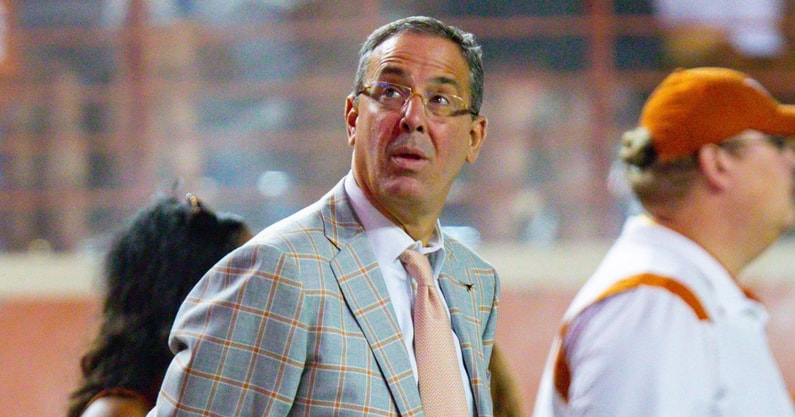Chris Del Conte: 'We've lost our voice of what college athletics is about'

On May 23, the NCAA and its Power Five conferences voted to accept the settlement of three antitrust cases in the House vs. NCAA case. The decision effectively ended the concept of amateurism at the collegiate level.
The NCAA will now shift toward a revenue-sharing model, which will allow schools to directly pay athletes. Specifically, schools are expected to have a $20 million budget annually, with the freedom to disperse the money among its athletes.
Of course, athletes can also still receive money from NIL opportunities and collectives. Nonetheless, athletes can soon expect a baseline wage for their efforts. University of Texas athletic director Chris Del Conte recently weighed in on the monumental change.
“We’ve lost our voice of what college athletics is about,” Del Conte said. “No one wants to hear that but only 2% of our student-athletes are going to go pro. The rest of them are going to be doctors, lawyers and great productive citizens.”
Del Conte has been the athletic director at Texas since 2017. During his time with the university, he has witnessed massive change, including the introduction of NIL, the transfer portal and the COVID year.
However, Del Conte has not forgotten what college athletics used to be. Not long ago, there was no money involved for athletes. Their payment was their education, along with housing and food on campus. Most of them had no hopes of playing their respective sports professionally.
Top 10
- 1
Rick Pitino
New sheriff in Big Ten?
- 2
Ryan Day
Buyout revealed from new contract
- 3
UNC president
Belichick hire fall out
- 4
'I'm 1-0 vs. PETA'
La. Gov. defends LSU live tiger
- 5
2025 CFB odds
Key game point spreads
Get the On3 Top 10 to your inbox every morning
By clicking "Subscribe to Newsletter", I agree to On3's Privacy Notice, Terms, and use of my personal information described therein.
Now, players will pass up on opportunities to go pro to continue to rake in the money from NIL opportunities and, soon enough, revenue sharing. Athletic directors like Del Conte have no choice but to adapt to not only survive but thrive.
They cannot worry about only the revenue-generating sports but must find ways to apply the new rules to all of their programs. While Del Conte may not agree with all of the changes coming to college sports, he knows he must embrace them.
“I have 21 sports now. We’re funding all 21 sports, giving them incredible opportunities through the educational model. So this landscape, we’re just gonna have to adjust to it,” Del Conte said. “We’ve all been there. We’ll figure it out. It’s just different pressures now.”
Chris Del Conte has put Texas in an excellent position as the revenue-sharing era begins. This summer, the school will officially join the SEC, which sits atop the collegiate landscape, along with the Big Ten. With enormous media deals and endless attention, Texas will have no problem finding money to share with its athletes.